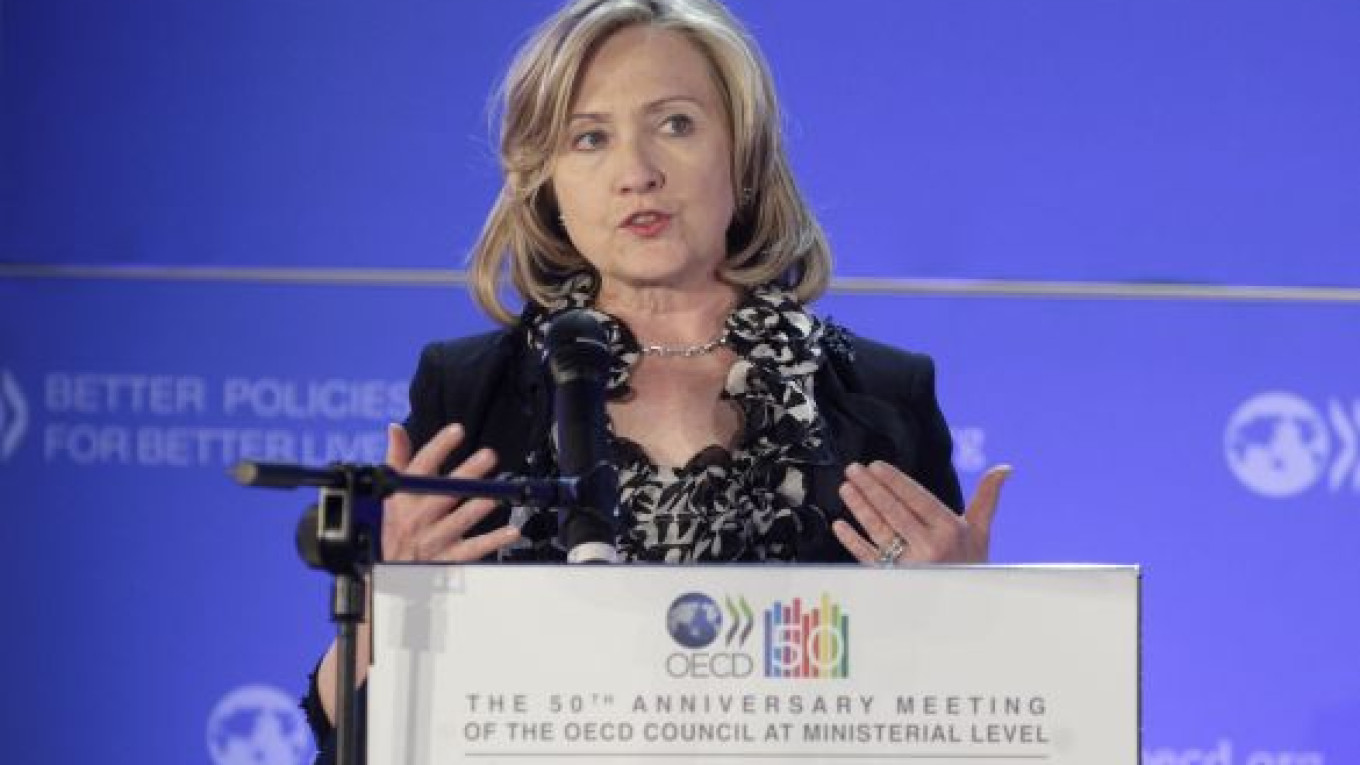Russia took a major step forward in its three-year effort to join the Organization of Economic Cooperation and Development, or OECD, on Wednesday when it signed onto the Western-dominated forum's anti-bribery convention at a ceremony in Paris on Wednesday.
Economic Development Minister Elvira Nabiullina looked on as First Deputy Minister of Foreign Affairs Andrei Denisov signed the convention, which outlaws bribery of foreign officials in international business transactions and provides enforcement measures. Thirty-eight countries have signed the convention, among them Brazil, South Africa, the United States and Britain.?
"We are looking forward to working with Russia as it continues to [move] toward full OECD membership," U.S. Secretary of State Hillary Clinton said after the ceremony.
"Meeting the high standards of the OECD will complement Russia's own goal of further modernizing and diversifying its economy and at the same time, Russia will enrich the OECD's efforts to drive economic and development cooperation around the world," she said.
This latest step in Russia's fight against corruption follows a long line of recently signed anti-bribery legislation. Last week President Dmitry Medvedev ordered the Justice Ministry to monitor how laws and court decisions are being enforced, and report on progress annually. Earlier this month, the president signed an anti-corruption law raising fines to as much as up to 100 times the amount of the bribe.?
However, the government so far has carried out just over a third of the? 26 anti-corruption obligations set by the Council of Europe's Group of States Against Corruption, or GRECO, of which Russia is a member, according to the group's report published in December.
Meanwhile, the State Duma continues to delay ratification of Article 20 of the United Nations Convention Against Corruption, which deals with illicit enrichment of public officials.?
But while anti-corruption efforts overall appear to be increasing, so are bribery and fraud. Corrupt officials steal practically every fifth ruble from the country's defense budget through kickbacks and bogus contracts, chief military prosecutor Sergei Fridinsky told Rossiiskaya Gazeta on Tuesday.?
No less important is the perception that bribery and corporate fraud have increased in Russia over the last three years, as confirmed by 58 percent of respondents to a survey addressing perceptions of corruption released last week by consulting and audit company Ernst & Young.
"The perception of corruption has grown," Ernst & Young partner Ivan Ryutov said. "If it's inside their soul, they talk about it openly," he said.
Ninety-three percent of 108 employees and managers of large Russian companies said bribery is widespread in the country, while 49 percent said the problem is pervasive in their specific industry. More than one-third of employees believe that some kind of fraud occurred in their workplace. In Europe those numbers are 62 percent and 16 percent, respectively.?
More than half of Russian respondents said there are anti-bribery measures in place at their companies, while in Europe that number is 49 percent. Only 19 percent of respondents in Russia said their companies have measures to prevent fraud, versus 29 percent in Europe.?
Businessmen in Russia are more inclined to doctor their company's financial statements and participate in bribery than anywhere else in Europe, and the country ranked second for lavish gift giving and providing luxurious entertainment to get and retain business.?
Corruption in Russia is a $300 billion industry, said Kirill Kabanov, head of the nongovernmental National Anti-Corruption Committee. Transparency International ranked Russia 154th out of 183 countries on its annual corruption index.
Several recent surveys highlighted the problem. According to a European University in St. Petersburg report published earlier this month, bribery is partly to blame for high prices of food, housing and services in Russia. The study revealed that if the bureaucracy was less corrupt and more efficient, real estate could cost 25 to 30 percent less, food prices could go down 15 percent, and communication — 10 percent.
Corruption and fraud will continue to be a problem until society begins to take it seriously, Kabanov said.?
But a move to codify business ethics is under way in Russian companies. Most large companies have established some kind of anti-bribery measures in the last three years, and small ones are following suit.
"Russian companies are keen to find ways of reducing the risk of corruption, and … they find bribery quite shameful and economically debilitating," said International Business Leaders Forum director Brook Horowitz. "They may have to go along with it in order to operate."
A Message from The Moscow Times:
Dear readers,
We are facing unprecedented challenges. Russia's Prosecutor General's Office has designated The Moscow Times as an "undesirable" organization, criminalizing our work and putting our staff at risk of prosecution. This follows our earlier unjust labeling as a "foreign agent."
These actions are direct attempts to silence independent journalism in Russia. The authorities claim our work "discredits the decisions of the Russian leadership." We see things differently: we strive to provide accurate, unbiased reporting on Russia.
We, the journalists of The Moscow Times, refuse to be silenced. But to continue our work, we need your help.
Your support, no matter how small, makes a world of difference. If you can, please support us monthly starting from just $2. It's quick to set up, and every contribution makes a significant impact.
By supporting The Moscow Times, you're defending open, independent journalism in the face of repression. Thank you for standing with us.
Remind me later.


